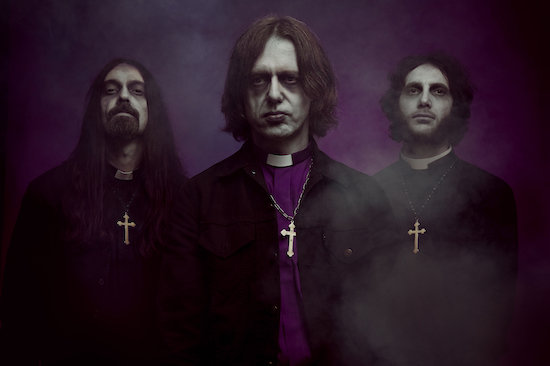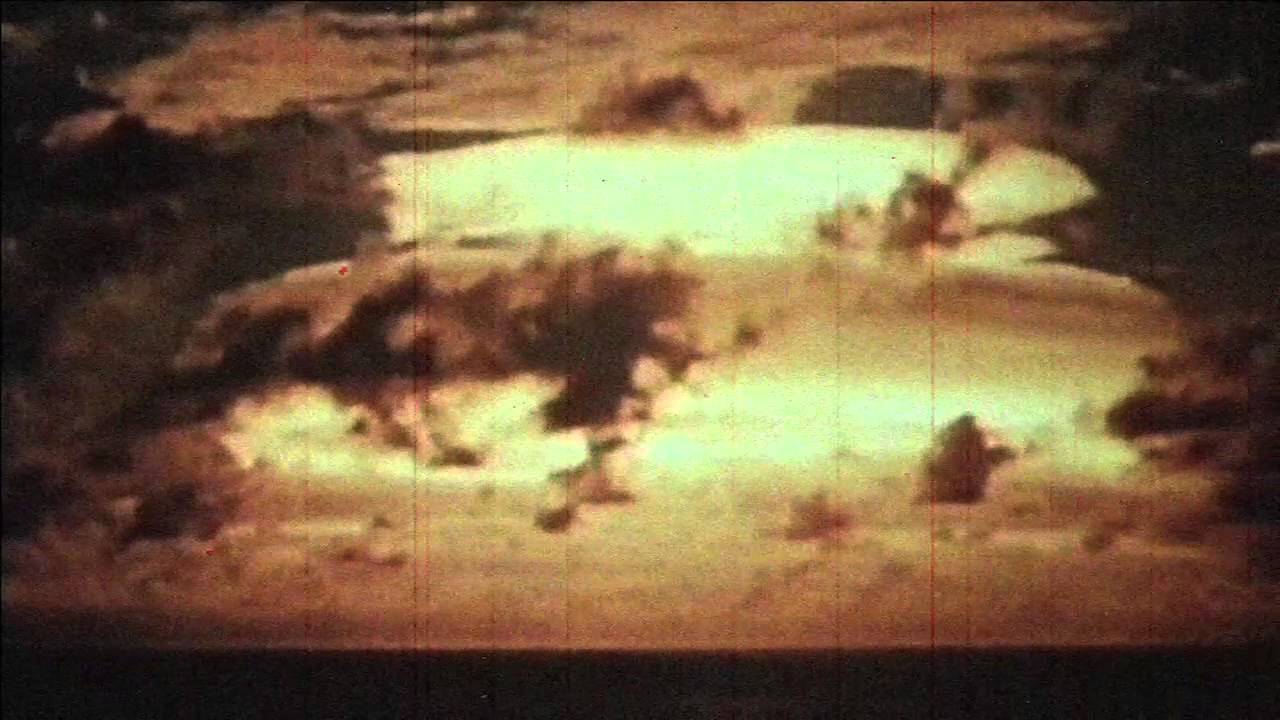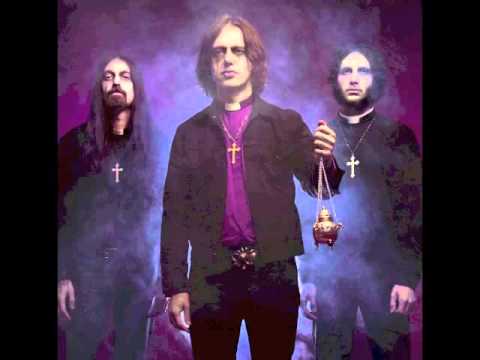Photograph courtesy of Ester Segarra
A swaggering fifth column of monolithic audio, a crushing, sub-laden majesty capable of upending trees and pulling you into the vortex of infinite space, With The Dead more than live up to the underground anticipation that accompanied initial announcements of the project.
Formed by ex-Electric Wizard rhythm section Tim Bagshaw and Mark Greening with Rise Above boss and former Cathedral and Napalm Death singer Lee Dorrian providing vocals, their self-titled debut LP is one of the most caustic slabs of malevolent, chaotic, fuzzed-up brutality of the past few years. Highly likely to induce inordinate pleasure in anybody who enjoys blackened rock & roll that teeters close to the edge of disintegration, it is direct, seriously angry and properly heavy. Propelled by punkish exuberance and a no frills, sub-loaded production, it seeps malevolence and bleak soul.
Born partly out of frustration with the well publicised controversy with Electric Wizard (Mark Greening was sacked from the band in 2014 and there have been ongoing legal issues since then due to alleged non payment for his performances on Time To Die), With The Dead reunites Greening and Bagshaw – who last played together in the criminally underrated Ramesses (currently on hiatus). Bringing their famously powerful and ramshackle sense of groove to bear to fine effect, Bagshaw was also responsible for all the guitar work on the album, unfurling killer riffs with ease. Add the idiosyncratic vocals and lyrics of Dorrian (who is also releasing the record on Rise Above) and the term ‘doom supergroup’ would not be entirely unsuitable (if it didn’t conjure images of studio quackery and Supertramp, that is). Before the album hits shelves later this week, tQ caught up with Dorrian.
How did you get involved in With The Dead?
LD: They asked me to get involved. It wasn’t some kind of thing where we wanted to take over the world or anything like that! I’ve remained really good friends with the guys over the years. Tim lives in America now, he lives in New Jersey, he’s been there a few years now – hence the reason that Ramesses aren’t really active any more; he’s actually in another band over there called Serpentine Path. Earlier last year he was back in the UK for a bit and hung out with Mark. They talked about having a jam and maybe getting something together. I’m not sure what the initial idea was, but I think Mark was out on a limb because of all the drama with Electric Wizard, I think he felt he wanted to do something again.
Tim told me that they wanted to have a jam and see what would come out of it. They asked me if Rise Above would be interested in releasing something if they got it together and I said, "Well, yeah, of course! Keep me updated and send me any tracks that you’re working on so I can have a listen." He started writing a few tracks, recorded them at home. He put the whole demo together in his home studio on a four-track. I loved it; it was just what I thought heavy music needed, really – unpretentious, fucking heavy as shit. I instantly thought it was killer, even on that little home-made cassette. I certainly thought I’d like to be involved as a label, but at that stage there was no indication that I’d be involved ‘in the band’.
And did those initial songs form the final record?
LD: They talked about wanting to do an EP at first, but I thought there was no point doing that – it’s a redundant format. I thought it would be best to try and get as much material together for an album. They came up with a couple more songs on the spot. I thought they needed a really extreme, real slow track and they came up with ‘Screams From My Own Grave’, also a bonus track called ‘Celestial Suicide’.
Rough versions of those tracks were then re-recorded, but it didn’t sound right. The studio wasn’t the greatest; it all sounded a bit rushed. Round about the same time they asked me if I wanted to do the vocals. I was a little hesitant at first, just in terms of being able to dedicate the time to being in a band again. I wasn’t too keen with the sound of the recordings. I loved the material, but the sound didn’t do it justice. They took some time to focus on the dynamic of the songs, approached them with a little bit more time. We reconvened in March this year and by that time they’d added the spark that needed to be added. We had a couple of rehearsals in Kentish Town, then went out to Jaime Gomez Arellano’s Orgone Studios and recorded all the backing tracks in about six days. Later, I did all the vocals in one evening – in about two hours or something – without much thought at all, it felt really instinctive.
There’s a really organic sound to the record. It’s epic but not remotely overblown. There’s a real gnarled punk edge to the sound.
LD: We always said that if we were going to do this, we would have to make the most uncompromisingly heavy, brutal, crushing record that we could possibly make. That was literally the only goal and when you’ve got that as your only goal, you can be focussed on that. That’s not to say it’s easy, but you have a strict way of thinking of how to approach it. When you have all of these other elements or that pseudo, ‘oh, it has to be original’ crap, it can get diluted.
The personality can get lost?
LD: It can – but with this we just wanted it to be as primal as possible. I was in Cathedral for twenty years. It was an amazing time and everything, but you can sometimes get to a point when you feel in a bit of a rut; I wanted to get to the point where there was no baggage hanging over anything. I just wanted this to be a new thing, to sound as fresh as possible. Direct and from the gut.
There is a real loose edge to the playing, especially with Tim and Mark as a rhythm section. They have an ability to ride a groove just on the edge of disintegration; it adds a raw soul to the music. In metal, rigidity is so often the norm. Does this piss you off?
LD: Of course – that is everything that is wrong with metal these days. It’s too precise and too clinical and too drawn-out – I just think the energy is lost and the vibe is lost. People just need to re-approach it; I really feel that so much soul is missing from modern metal. I guess this is our little attempt to put put some back, not dwell on it too much, but get in there and blast it out.
Do you see this as being a touring band?
LD: I’d hope this was not just a one-off album project, because I think it’s too good for that – I’d much rather we did something more than one album. I can’t physically contribute as much to this as a full-time band though, because I have too many other commitments going on.
With the label?
LD: Yeah. There have been times with the label where I’ve left it in other people’s hands and they’ve almost completely fucked it up. I have to stay on top of it. I have to because I’ve witnessed some potentially very dangerous signs, letting people do stuff before… I’ve had to take it all back to make sure it doesn’t get fucked up. Every aspect of the label is important to me; it’s not just something I do for the sake of it, it’s life and death to me. I can’t be in the kind of band that is going to go touring round the world eight months a year, I physically couldn’t do that. There is no need for that; if we can make some decent records, as long as the energy is there and the will to do something, then I don’t see why not. But there is nothing written in stone: there is nothing to say we’ll do shows and nothing to say we won’t. If we do, we’ll have to find a bass player because Tim did all of the bass and guitar on the album.
Some people who haven’t really explored the label might consider Rise Above to be a purist doom metal label, but you do a lot more than that. One of the bands I’ve had on heavy rotation the past few years has been Admiral Sir Cloudesley Shovell, they’re incredible. I wanted to ask about those guys specifically – what made you sign them?
LD: Admiral just had something about them from the start. They sent me a demo that was done on a four-track in a couple of hours. They had everything I like about underground ’70s bands, but they also have a kind of snarly, fuck you punk attitude that goes with it: it’s fucking great. I love that band. They’re kind of like Motörhead – the live style of Motörhead; I don’t mean they try to sound like Motörhead – they have that unpretentious rock & roll attitude. Some people think they’re kinda ‘old man’s rock’, but they’re missing out.
You’ve released music from garage rock through to psych, folk, all sorts…
LD: The label just reflects my personal taste really, there isn’t an agenda. I suppose the turning point was when we did the second album by Circulus, which was kind of folky. People said it wasn’t valid to what we’re about; but to me I’ve always thought that a record label should reflect the taste of the people that run it. If this wasn’t my record label, I’d be a massive fan of it because it reflects my tastes. I always put myself in the armchair perspective of how I’d perceive it if it wasn’t my label, and if something grabs me it grabs me.
I think so often the most interesting music in any given genre is made by people who have broad tastes outside it. Does the purist attitude ever piss you off?
LD: Yeah. I’m not one of those people because I didn’t grow up with that kind of mentality. When I was growing up, metal wasn’t even high up on my list of musical priorities at all. Initially, Rise Above was a label to get me off the dole and do a few 7"s for friends. I grew up with punk and I was into Motörhead and Venom, then I heard Metallica and things changed; my attitude to metal changed but not exclusively metal. I mean, I’ve never been a fan of Manowar, sorry! I’m not a diehard metalhead. I love certain parts of it but then I also love avant-garde, I love folk music, I listen to weird electronic music – I’m just a music fan, I don’t tie myself into one little book, you know?
I do understand elitism when it needs to be put across. When something really dilutes the general sound or it becomes commercial, I understand that mentality. But I don’t always buy it because I’m not that narrow-minded – if there is stuff I want to explore and stuff I want to hear and see and feel, then I’m not going to think to myself, oh, I can’t do that because such and such wouldn’t agree, I mean, that’s fucking bullshit in any walk of life. I always think it’s very important to follow your own instincts. Life is too short, just take it all in. I mean, I know what I don’t like…
Can you tell us a little bit about Roadburn? You’re curating the festival next year.
LD: I’ve known Walter [Hoeijmakers, Roadburn founder] for years, since the mid-’90s. Cathedral played the first ever Roadburn in 1999. We headlined the very first one. It was more like a gig with a few bands on. In the past, whoever has curated the event has usually been in a band that end up headlining the main night, I suppose. But with me not really being in an active band, he invited me to do it in a different way – in the main room and also the Patronaat theatre. I think it’s an amazing festival. Some other festivals have tried to copy the formula of Roadburn and I think it’s kind of lame the way they’ve done it, because the whole thing with Roadburn is it’s totally genuine; I see some other festivals as trying to cash in on the standard that Roadburn have set. It’s put together by people who really care about music and when you have that as the root of the whole thing and when you have that kind of motivation first and foremost it’s not going to be shit. I’m really looking forward to it.
You’ve just announced that Pentagram are playing – what else have you got planned?
LD: It’s not gonna be a load of Rise Above bands or a load of doom bands. It’s a process of elimination, first and foremost. I’ve got a load of really cool ideas and I’m talking to a lot of people, so it should be great. It’s certainly not going to be a load of doom bands; it’ll be stuff I’ve been into over the years. Obviously I can’t say who they are until they’re confirmed. I just want it to be interesting for everybody. I’ve asked a few that don’t actually exist anymore to see if they’d be up for getting back together but generally that has been too complicated to make happen.
You’ve seen doom grow from a really tiny subgenre to a powerful underground force…
LD: It was a tiny community. In the ’80s Candlemass was probably the most recognised doom band. Behind them was Trouble, then lower down the scale Saint Vitus and lesser than them Pentagram. And they were the classic second wave doom bands after Sabbath, I suppose. Obviously Witchfinder General, who were my favourite of the lot, really.
I used to love the detailed liner notes Cathedral records had, turning people onto this stuff. Was that important to you?
LD: We wanted to share our discoveries really. We were so bored of the way that extreme metal had gone. It was just so boring and stale. We’d discovered a load of other bands which were – to our mind – as heavy, if not heavier, than a lot of the so-called extreme bands which were just a load of regulated, compartmentalised song structures, plagiarised riffs; you know, "There’s the Death riff, there’s the Morbid Angel riff and there’s the Obituary riff."
Everything had become by numbers. It just became stale and boring. We weren’t trying to relive the past or anything, we were just trying to point people in the direction of bands that had a bit more feeling in their music. More to get inspired by the freedom that had been stolen or taken away from music; to listen to music from a time when there was a lot more self expression and a lot more thinking to music that had been made, that was the feeling that we had. Just to try and show people that there was more that we thought was cool that wasn’t written about in magazines.
The production on With The Dead is seriously warm and weighty. Can you tell us a little bit about the recording process?
LD: Gomez recorded the record. We all just spoke our mind and said exactly how we wanted it to sound. We just wanted it to be as devastating as possible; I think it was easy. The way it was recorded was just like that. As soon as the first mixes came back from Gomez, he just got it, what we were saying, it was perfect. I think when something like that has been in your system for so long… we didn’t ask for any changes at all; it was so easy.
‘Nephthys’ is the most classical tune on the record, that is a very pure old school Sabbath vibe.
LD: On that one, more than any of the other, it’s a Master Of Reality vibe to the riffs, kind of early Sabbath. Lyrically it’s the most esoteric one, I suppose, the others are all pretty clear what they’re about, but that one is a little more cryptic.
It’s about sex.
LD: [laughs]. You’re certainly along the right vibes. It’s about love and sex… and death!
With The Dead is out on Friday, October 16, on Rise Above Records. Roadburn Festival runs from April 14-17, 2016 in Tilburg, Netherlands; for full details and tickets, head here




